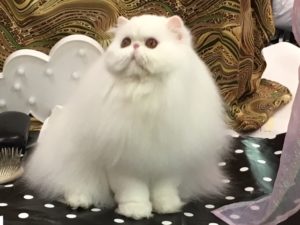 According to statistics, a whopping fifty-eight percent of America’s household cats are overweight. Over thirty percent are considered obese. This trend shouldn’t be too surprising since sixty-six percent of American adults are considered overweight. Our pets are part of the family and it appears that we really do treat them as family by overfeeding them and allowing them to live a sedentary lifestyle.
According to statistics, a whopping fifty-eight percent of America’s household cats are overweight. Over thirty percent are considered obese. This trend shouldn’t be too surprising since sixty-six percent of American adults are considered overweight. Our pets are part of the family and it appears that we really do treat them as family by overfeeding them and allowing them to live a sedentary lifestyle.
Sure, the tendency for a cat to gain weight can be genetic. Sometimes the cat has a medical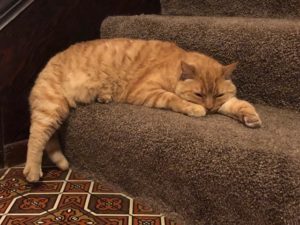 condition that causes weight gain, but for most of our fur-babies, it’s simply an issue of too many calories and not enough activity. (Where have you heard that before?)
condition that causes weight gain, but for most of our fur-babies, it’s simply an issue of too many calories and not enough activity. (Where have you heard that before?)
If you suspect your cat is overweight or suddenly gaining weight, it’s time for a vet check. Maybe you haven’t noticed that Fluffy is fluffier. If visitors and neighbors mention how much “bigger” he is, or if you notice he’s no longer keeping certain areas of his 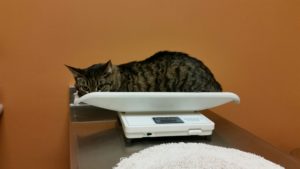 body clean, if he has become more lethargic, these could be signs that he’s too fat. What should you do? First, make an appointment with your veterinarian to find out if there’s a health issue.
body clean, if he has become more lethargic, these could be signs that he’s too fat. What should you do? First, make an appointment with your veterinarian to find out if there’s a health issue.
If you can’t feel your cat’s ribs and when you look down at your cat you cannot see a definition for a waist, it may be time to discuss with your veterinarian a weight-loss plan. This might include a gradual change in diet or the amount you are feeding, and definitely more exercise. Here are a few tips:
1: Provide a food puzzle or hide his food around the house so he has to work to find it.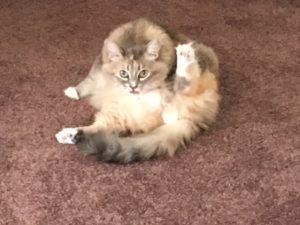
2: Bring in kitty-cat exercise equipment—climbing apparatus, interesting toys.
3: Play with your cat more.
4: Train him to a harness and leash and take him for walks around the yard or the neighborhood.
5: Cut down on his treats.
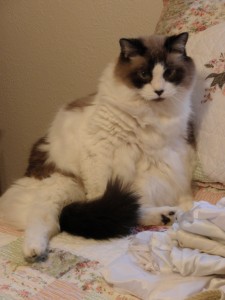
Max
Fat cats are kind of cut, but the extra weight is definitely not good for your cat. Several health issues are related to obesity. They include diabetes, arthritis, liver disease, and urinary tract disease. Overweight cats can more easily suffer heat-related issues and surgical complications, as well as a reduced lifespan.
If your cat is reaching midlife (five to ten years), and is starting to pack on the pounds, take steps now to reverse this tendency. This is by far the best insurance for a longer and more healthy life for your beloved cat.





